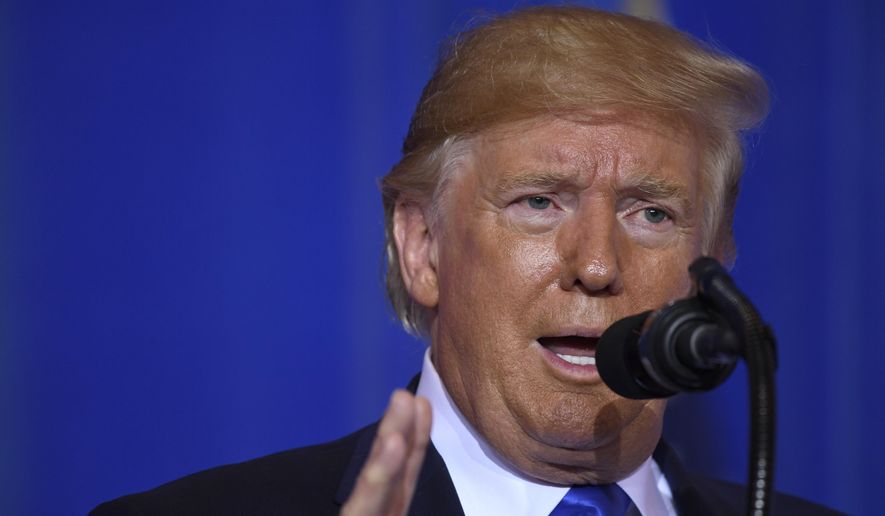Momentum is building at the White House for President Trump to cut capital gains taxes by executive order, allowing him to boost the economy without Congress, where House Democrats would be all but certain to block a legislative proposal.
Sources close to the White House confirm that the president is looking seriously at the idea of issuing an order to index capital gains to inflation, which would cut taxes for investors when they sell stock or real estate.
By taking such action soon, advocates in the White House argue, the economy would receive a significant boost before November 2020.
“It would be an enormous stimulus of new capital investment into the economy,” said economist Stephen Moore, a Trump ally and columnist for The Washington Times. “I think it would be one of the most stimulative things that Trump could do for the economy between now and Election Day.”
While the total impact isn’t known, Mr. Moore said, “you’re talking easily hundreds of billions of dollars.”
The risk politically is that an executive order could face a legal challenge. People familiar with the matter say the White House has not yet sought a legal opinion; President George H.W. Bush considered cutting capital gains taxes without Congress in 1992, but Treasury Department lawyers reportedly said the government lacked the authority.
Democrats criticized the anticipated action by Mr. Trump, calling it a giveaway to the wealthy. Democratic presidential candidates Sens. Bernard Sanders of Vermont, Amy Klobuchar of Minnesota and Cory A. Booker of New Jersey are calling for raising the capital gains tax.
“Donald Trump’s primary goal is to further slash taxes for himself and his wealthy political allies,” said Sen. Ron Wyden of Oregon, top Democrat on the Senate Finance Committee. “This would be plainly illegal. It would be outrageous to circumvent Congress to again cut the capital gains rate by indexing it to inflation. Republicans must be nervous about Donald Trump’s reelection chances if they are considering such a drastic step to continue looting the Treasury.”
According to the nonprofit Tax Foundation, indexing capital gains for inflation would cut taxes like this:
If a worker invested $5,000 in the stock market in the year 2000, and that investment had risen to $8,000 last year, current law calls for the investor to pay taxes on the entire $3,000 gain.
But most of the gain — about $2,100 — was due to inflation. By taxing only the $900 gain that wasn’t caused by inflation, the investor would pay a substantial lower tax.
Alfredo Ortiz, president and CEO of the conservative Job Creators Network, said the potential move “would be just the latest big victory for small businesses under the Trump administration.”
“The capital gains tax exacts a significant toll on small business owners, especially considering that it not only applies to asset appreciation but also to the phantom gains associated with inflation,” Mr. Ortiz said. “This means the effective capital gains rate is far higher than its stated 23.8%. This punishes small businesses for successfully growing their companies. The Trump administration’s plans to take executive action to correct this injustice and index the capital gains tax to inflation would bring additional tax relief to small business owners while adding fuel to the current economic fire as entrepreneurs realize their capital gains and reinvest the proceeds.”
Mr. Trump scored a big victory with a Republican Congress in 2017 by enacting tax cuts for businesses and individuals. The major tax cuts were credited with boosting economic growth and reducing unemployment to record lows.
Now with reelection approaching and Democrats controlling the House, Mr. Trump is seeking another jolt for the economy, which faces uncertainty from trade wars and slowdowns in other parts of the globe.
A University of Pennsylvania Wharton School analysis in 2018 found that the top 1% of tax filers would receive more than 86% of the tax cut, while 1% of the benefits would go to households in the bottom 80%. The study estimated that indexing would reduce tax revenues by $102 billion over the next decade.
The White House Council of Economic Advisers also released a report Friday asserting that Mr. Trump’s approach to federal regulations will raise incomes annually by $3,100 per household after 5 to 10 years.
“Deregulation is the cornerstone of the president’s pro-growth economic policies,” Tomas Philipson, an economic council member, told reporters.
CEA examined 20 of the administration’s regulatory rollbacks in areas such as health care and banking, saying the moves will save consumers and businesses about $220 billion annually.
“These deregulatory actions are raising real incomes by increasing competition, productivity, and wages and by reducing the prices of consumer goods, while maintaining regulatory protections for workers, public health, safety, and the environment,” the economic council wrote.
• Dave Boyer can be reached at dboyer@washingtontimes.com.




Please read our comment policy before commenting.